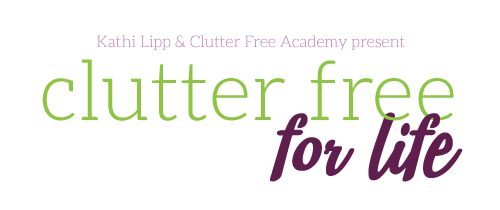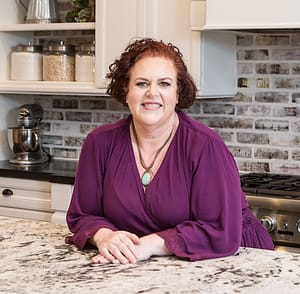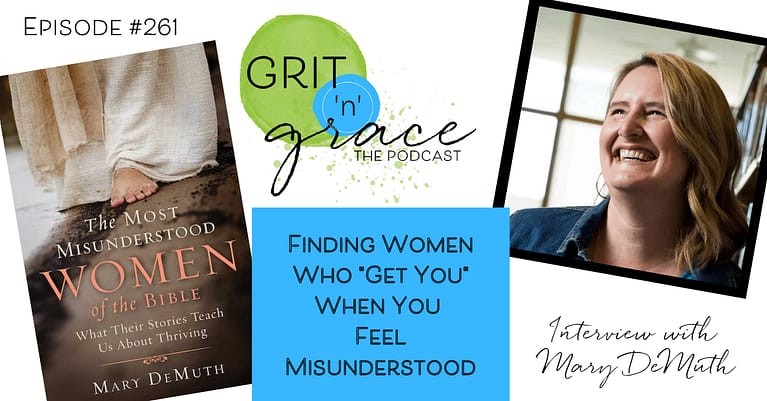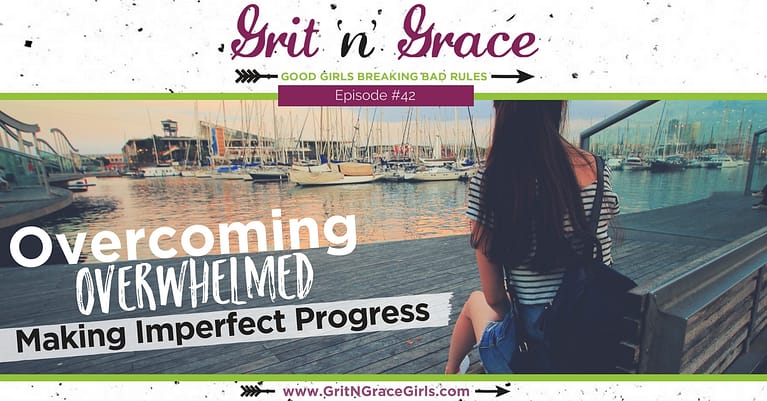
Recently, we’ve all been tested in the area of crisis preparedness. What grade would you give yourself? Were you ahead of the curve or scrambling to catch up? Kathi Lipp, author of Ready for Anything, gives us practical steps to be prepared when an emergency, natural disaster, or other crisis hits. Listen in today so that you, too, are ready for anything!
(This page contains affiliate links. Your clicks and purchases help support Grit 'n' Grace at no extra charge to you.)
Recommended Resources
- Kathi Lipp’s newest book — Ready for Anything: Preparing Your Heart and Home for Any Crisis Big or Small
- Ready for Anything freebies and goodies
- Kathi Lipp’s Clutter Free for Life membership program
Downloads
Your Turn
- Do you feel prepared or unprepared for crisis? Why?
- What area do you feel the need to prep for most– food, supplies, finances?
- What’s one practical prepping step that you can take today?
Special Guest — Kathi Lipp
Best-selling author Kathi Lipp inspires thousands of women each year to strip down their expectations and live with real purpose. With humor and wisdom, Kathi offers hope paired with practical steps to live with meaning.
Kathi has written 20 books, including The Clutter-Free Home, Clutter Free, The Christmas Project Planner, The Get Yourself Organized Project, The Husband Project, and Overwhelmed. She is the host of Clutter Free Academy the Podcast! with Kathi Lipp She also runs the Facebook group Clutter Free Academy where thousands of women (and a few brave guys) support each other in living a Clutter Free life.
She has become well respected on the topics of clutter from a biblical perspective (who knew there was such a thing?). She is a national speaker and is often featured on Woman’s World as one of their “Ask the Experts”, Focus on the Family, MOPS International, Crosswalk.com, Girlfriends in God and Proverbs 31 Ministries as well as a number of other media outlets around the country.
Transcript — scroll to read here (or download above)
****
Grit ‘n’ Grace: Good Girls Breaking Bad Rules
Episode #189: How to Move Beyond the Catcher-Upper Life
Amy: Cheri, one of our listeners said something a little heart rending last week she said “I discovered that when I’m hyper focused on doing something perfect, I actually end up procrastinating and ultimately avoiding the task potentially missing out on an opportunity God had for me to grow and learn all because I’m preoccupied with having to do it or prepare it perfectly.”
Cheri: I identify with that so so much How about you? What is something that you have procrastinated even though you knew you should do it and it would be good for you to do it?
Amy: Well, I think there are two areas of my life that I procrastinate in generally I would say I’m not a procrastinator. I love it to do list. Action Amy checking it all off. However, there are two areas one is going to the grocery store. Really ain’t going to the grocery store. So what inevitably has happened in our family is I don’t go to the grocery store. There’s no foods We go out and eat in a less healthy way that we need to eat. So the whole 30 journey has been helping us with that. But the other one is probably surprising because I’m a speaker and people I love to speak but I hate writing my messages. It is so so hard to so for me, it’s things that I don’t like or that seem too hard, and that causes me to procrastinate and I will procrastinate writing a new message like nobody’s business, what areas do you find yourself procrastinating in?
Cheri: Well, you’ve done a great job here of laying it out something you what are the two things you don’t like
Amy: that I don’t like or seems too hard.
Cheri: You don’t like it seems hard. So I oh my goodness, you just made something come to mind. So Daniel had two surgeries last year, and there was all sorts of insurance mix ups like they gave us different numbers and different cards. So for the first surgery in April when we went to pick up his prescriptions, they said that our prescription coverage with terminated so we paid several hundred dollars for these really specific The eyedrops he needed for the surgery. And so I expected in November when he had the second surgery that I would present my card and they would say no which they’re not covered. And to my shock, and gratitude. I mean, I was overjoyed. Instead of paying well over $600 I paid $60. Wow. Well, of course, I came home going, well hang on a second. If they would cover it in November. It means they should have covered it back in April. So now we’re going to, I don’t want to do it. And it seems too hard. Okay. Like I hate paperwork. And dealing with insurance seems so hard. So I’m like, oh, November. Well, Thanksgiving is coming December. Oh, Christmas is coming January. It’s a new year, February, I had some travel. And so Spring Break March seemed like a really good time to do it. Because that was still within the one year. Well, let’s see what happened in March. You know, we’ve had this pandemic and so I found myself like looking at the calendar figuring out exactly what was the date that was going to be one year and so here it is. Under the worst possible conditions, because I still don’t want to do it, it still seems hard. And now I’m doing it under all of this pressure. And the bottom line. The good news of this story is is that even though I made pretty much every mistake possible, once I found out exactly how to do it and submitted it, and then confirm that they got it a week later, we got a check for $400.
And I like, yes, but I’m like, why didn’t I just do that earlier? What was with all of this crazy procrastination?
Amy: It is such human nature, isn’t it?
Cheri: Well, this is Cheri Gregory.
Amy: And I’m Amy Carol,
Cheri: and you’re listening to Grit ‘n’ Grace, the podcast that equips you to lose who you’re not love who you are, and live your one life well.
Amy: Today we’re talking to Kathi Lipp, author of Ready for Anything: Preparing Your Heart and Home for Any Crisis Big and Small. Kathi inspires thousands of women each year. to strip down their expectations and live with real purpose. with humor and wisdom, Kathi offers hope paired with practical steps to living with meaning. Kathi has written 20 books including the clutter free home, clutter free the Christmas project planner. They get yourself organized project, the husband project and overwhelmed. She’s the host of clutter free Academy, the podcast with Kathy lip and runs the Facebook group clutter free Academy where thousands of women and quite a few brave guys support each other and living a clutter free life. She has become well respected on the topic of clutter from a biblical perspective. Who even knew there was such a thing?
Cheri: Well, and before we dive into our interview, we want to tell you about Kathi‘s Clutter Free for Life membership program. Clutter is a secret source of shame for more than half of the people in the United States. Like if you’re listening to this, you’re either struggling with clutter or you love someone who is.
The secrecy surrounding clutter is what feeds its power. We can’t get help for something we can’t talk about.
Clutter Free for Life as a membership program that offers the help you need with others who feel your pain in the past year alone. The clutter free for life program has helped us members give up storage units they’ve rented for years, prepare their homes for foster care and adoptions and even welcome dropping company with almost no notice.
That’s a biggie. Would you like to have a home that’s a haven to live in and to visit. clutter free for life is the program for you.
Now the regular price is $299 a year. But for our Grit ‘n’ Grace listeners Kathi is offering a special 60% discount that brings your rate down to 118 which ends up being less than $10 a month. So head to GritNGraceThePodcast.com/Kathi for full details, including the special coupon code to get your discount.
Amy: So Kathi, tell us the story of Ready for Anything. I’m holding my breath as I asked this question, but – were you born prepared, and just finally decided to tell the rest of us how to do it right?
Kathi: Okay, so for anybody who is wondering – are these just spontaneous questions? – no, no, no, no. Amy and Cheri know me better than that. Okay, so it’s the weirdest story. For my 50th birthday, we were trying to get to Europe, and then we had to lower expectations; it just wasn’t gonna work. So we ended up going to Canada and I set up all these Airbnbs and I was so excited. What I failed to check out was were there laundry facilities at each of these Airbnbs! And so I spent a decent part of our vacation – because we packed really lightly, we went the Cheri Gregory route, and we just did a backpack and a carry on, which – by the way, yeah, it was great one time, I felt like a college backpacker, but never again. Anyway, so we had to do our laundry on a regular basis. So I’m in these hot, dusty laundromats in Canada and thinking “There’s got to be a better way.” So I started Googling “How can you do your laundry without a washing machine?” And it took me to prepper sites. And if you’re not sure what a prepper is, think Doomsday prepper, think end of the world, think dark net. So I went down some very very dark rabbit holes. I thought “Okay, these sites scare me.” Like I, I was like, “I don’t want to be here.” But I found one site that was really interesting and she showed how to do laundry without a washing machine. And by the way, let’s hope it never gets to that guys, ‘cause It’s a lot of work. Also, she talks about, you know, are you prepared if you lose power? Like, what? And it’s not just if you lose power, what if your grocery store loses power? And what if your gas station loses power? And I thought about that, and I thought, you know, I have been in that situation before and we can handle it for a day, maybe two. But then after that, would I be prepared? And I started to think about preparedness, not just as a natural disaster, but also a financial disaster. What if Roger loses his job? What if somebody in my household is really really sick and needs to be, you know, isolated? Little did I know, you know, the entire world would need to be isolated. So that’s what got me down this road and in I used to be scared of preparedness. And this was very empowering to think, “Well, there are some things I could do that would help me be ready no matter what the disaster was.”
Cheri: You talk early on in your book Ready for Anything – love that title, it’s just, it sounds so hopeful –
Kathi: It is hopeful! Yes.
Cheri: I want to lean in right away. I want to be ready for anything. And you talk about two types of people: the plan aheader and the catcher upper. Can you describe a bit of your life as a catcher upper? What was that life like way back when?
Kathi: I think the best example is that I would put like $2 or $3 worth of gas in my car. Right? Because I was a 20 something, I had better things to do with my money than gas, like that’s the most boring thing you can spend money on, right? Except for insurance, which I didn’t have, by the way. Both of those super boring, but – so I would do that because I had one of those magical cars that actually went pretty far at a few dollars worth of gas. But I kept pushing how far could I go and I, I would end up not just pushing my luck but pushing my car. And I was also the person who – I, I took out credit cards. Like I had a Nordstrom card and I got it in the mail and I was so excited. My mom’s friends were like “She knows she has to pay that off, right?” Like, abstractly, I did know it. But in my heart, I really didn’t. It was just – I was borrowing ahead on everything, on time, on money, on energy. You know, I’d stay up till three in the morning because that was the fun thing to do, even though I needed to be at work at eight o’clock, you know. I borrowed ahead on every aspect of my life and I was constantly trying to catch up. And here’s what I did. Not only did I try to catch up, I would blame other people. And I would blame other circumstances. And then it got so bad I was lying about why I was late to places, why I was out of money, and I got to a point where I just, I didn’t like myself in my 20s. You know, I was not, I was not the person I wanted to be. And that is what a catcher uppers life looks like, eventually, because you never catch up. Because you never can. You know, you may get lucky once or twice, but it’s it’s an awful way to live. You overdraft on every area of your life.
Cheri: And is that an exclusive problem to people in their 20s?
Kathi: (Laughs) Let’s just say I have some residual in my 50s that I’m dealing with, but you know what, it’s, it’s every area where you think “Well, I’ll deal with this later.” And you know, I’ve got some health issues that I am recovering from because of that attitude. And so here’s the thing, I don’t want to, to bang on people and make them feel guilty, because we all have this to a certain extent.
Cheri: Absolutely.
Kathi: And also, there’s there’s something beautiful and carefree about not worrying about everything in the moment, and not worrying about your future all the time. But at some point, we have to know that everything has a cost. We either pay it now, or we pay it later with interest. And so where – yeah, where do I want to spend my money?
Amy: So, so good. Well, so any course correction for women, of course, points directly to Proverbs 31, right? ‘Cause she’s not intimidating. So tell us about the Proverbs 31 prepper. What changed about your relationship with the Proverbs 31 woman as you wrote.
Kathi: Okay, I think I read her story when I was 18 and refused to read it again until my 40s. Because here’s the thing. I did more talking about and listening about the Proverbs 31 woman than I did reading about her. You know, I would, we would just say, “Okay, she’s this unattainable ideal.” Yeah, she is. But here’s the other thing. There’s nothing haughty about her. There’s nothing that says see what I can do that you can do. There, there is all this goodness in her. She’s not just taking care of everybody around her, which is really, really important. What she’s doing is she’s taking care of her own life. She is in charge of her own destiny. She trusts God, she honors God. She trusts her husband, she honors her husband. But she’s, she’s amazing. She’s a boss. And she is buying a field. She is, she’s a textile artist. She is negotiating great prices for her family. She is somebody who’s not letting life happen to her. She is happening to life. And she’s the ultimate prepper. Like, she’s storing up food for her family. She’s saving money for herself and her family. And I just I love that what it really showed – you know, you think about that time in history. What was a widow’s fate? A widow’s fate was destitution. But this is a woman who was taking care of herself and her family. And that’s the, that’s when it changed for me. It wasn’t just somebody who was showing off to say “Look how holy I am.” She – there’s a holiness, but there’s also a hustle that was – that – it’s not exhausting, it’s pleasing. It’s like she’s taking all of her talents and using them for her best. And that’s what I love about prepping, because we all have talents. We all have gifts, and we get to lean on each other’s strengths, whether that’s us and our husbands, or maybe it’s the us and the best friend. I’ve got some friends who are great at medical stuff. That is not my jam. So when it comes to an emergency, I would call on them. But also, there are times, like, if you’re in a crisis, I can cook for you for a week in one afternoon. We all have our gifts. And so when you look at her – okay, she’s got all the gifts, it’s not fair – but as a community as a community, we all have the gifts and we can take care of each other.
Amy: Well, you know what I love about what you just said, Kathy, is you talked about prepping, ing, that this is like ,something over time, it’s something ongoing. It’s not that we’ve prepped, like it’s already all done, and the Proverbs 31 woman’s like that too. I heard a great teaching on it that she didn’t do all that in one day. She did it over the span of a lifetime and that’s why your book is so great, is it gives us these simple steps.
Kathi: Well, and here’s what I love about her too. She didn’t, you know, she maybe learned some of this stuff when she was a child. But you have to think – all that negotiating for a field and planting – like a lot of that, she had to learn on the job. And so much of what I’ve learned about prepping – first aid. You know, I’ve been learning that as – I took a class when I was 16, that probably is not going to hold me into my 50s. So I’m learning about that. I’m learning about cooking off grid, I’m learning about, like, I’m really learning about saving money for the first time in my life and investing and things like that. And it’s never too late. My only goal for people is for them to be more prepared today than they were yesterday. That’s it. That’s it. It’s a small step, but it gives you power over your own life instead of your life being cast to the wind.
Cheri: Well, and one thing I know that you say, in your book, and I just know this from knowing you, is we’re probably more prepared than we realize, at least in some areas. So you say that one main reason people don’t get prepared that they don’t get themselves ready for anything is that they, they say they’re just going to trust God. Which I mean, we’re all Christians here, so what is wrong with saying they’re going to trust God?
Kathi: There is nothing wrong with saying you’re going to trust God. But when you say you’re just going to trust God, that’s when I’m going – going to have some issues. Because “just trust God” means that you have no responsibility in the circumstances. It means “I don’t have to do anything, I have special anointing and favor over everybody else. So even in the midst of a hurricane, God is going to protect me right here.” And it’s not Biblical. I mean, like, I can’t even talk. It’s not Biblical. It’s not okay. It is not following basic commandments of loving your neighbor. It, it’s none of those things. And also, when did wisdom be excluded from trusting God? That’s the thing. So what I love about the Proverbs 31 woman, she is wisdom 24-7, she, she trusts God – like I said, she trusts God, she trusts her husband. But she also knows that God has given her a brain. God has given her abilities, why wouldn’t she use those to take care of her family and to take care of her neighbors. And that’s where – when we can open the store houses and say, “Come on in, I’ve got enough for me, my family and for you. We can take care of each other. We can do this as a community.” I think the the old-fashioned idea of a prepper is the 10 years of canned beans and a gun. Like, I’m going to take care of mine, and me, and nobody else. And my idea of a prepper who loves Jesus says, “I take care of my family so that we can take care of other people.”
Amy: That was the thing I loved the most about your book, Kathi, is that it prepares us to serve others. And I just love that. So tell us the difference – because you kind of just mentioned this with Proverbs 31 woman and how she walked in wisdom – so what’s the difference between prepping in fear and prepping in wisdom? What is what’s the difference in the way those look?
Kathi: Yeah, I think it’s understanding what we have control of, and what we have dominion over, and what we don’t. And so where is my domain? My domain is to say, “I’m going to take care of my finances so that I’m not overdrawn in every way.” I’m going to use wisdom. I’m going to put tithe in, but I’m also going to put some money aside, and you know, that’s become really, really important to us right now as Roger and I are figuring out, okay, which of our friends need help? Which organizations do we see doing an amazing job, the only thing they’re lacking is funds? And then we also have four adult kids who, by the grace of God are all employed, right now, but for one of them, we don’t know that that’s going to be a long term, you know, situation because of the type of job she has. So we feel like we need to be prepared for that. And if we have no margin, then we have no ability to give. So I when I’m prepping out of fear, I’m taking care of myself. I’m like, I’m tightening down the hatches, I, I’m storing up the food, I’m taking from others so that I can have what I need. Now. When we went into this crisis, I had more toilet paper than any human should have. But it wasn’t because I went out and bought a bunch of toilet paper. It was because we always keep a few months stock on hand. And when I say a few months stock, we run a retreat center, so we have a few months stock for a lot of guests at our house. But the beautiful thing was we were able to share that with people. And you know, we’ve been able to share a lot of resources during this time. And it’s just that. It’s, you’re free to give it away, because you’re not fearful that you won’t have enough. And so how can I, how can I empower those people around me to do what they need to do by taking from what I’ve already done and being able to share it?
Cheri: That’s just such an amazingly different perspective. And so it must feel very different for you to be in the middle of this crisis than it’s felt in past crises that you’ve been through.
Kathi: You know, when I think about, you know, it was probably 15 years ago when I was stuck in a snowstorm with my first husband and two little kids, and we just didn’t have any resources. We didn’t have – we hadn’t talked about what our plan would be if there was a crisis. It was, it was a lot of infighting. It was a lot of thinking that we needed to do things a different way. And this, this crisis… I mean, it feels weird to say, but we are safe at home. And we’re able to help from the safety of our home. And I know that’s not everybody’s situation. I have a son who goes to work every single day with some very grateful customers and some not so grateful customers, and wasn’t allowed to wear a mask until three weeks into the crisis. Was not allowed to.
Amy: Wow.
Kathi: Yeah. And so I think about those things, and I think about you know, we are able to help in ways that we wouldn’t have been able to before and it makes you feel less hopeless and just so much more grateful for where you are. And when you, when you’re sitting in that place of gratitude, it’s so much easier to share than when you’re sitting in a place of fear and having to gather your resources around you.
Cheri: All right. Well, you have one simple goal for your readers and and for our listeners here – early in the book, you talk about getting to 3-2-3. Can you unpack this for us just a little bit here?
Cheri: And you’re right, it’s a very simple goal. It’s not always easy at first, but I want to give you some very doable steps to do. So 3-2-3 talks about the three areas we need to be prepared for, so that we can be prepared for any crisis big or small. And so these are kind of universal preps. Now. If you’re in earthquake country, I would say you also want to make sure that your bookcases – I see all these beautiful bookcases behind Cheri – are attached to the wall. You know, with Amy, you’re more hurricane. So there are certain preps you have to do. But all of us need to get to 3-2-3. So three is a three-day bug out bag. So this is a bag that’s packed with three days worth of clothes. Not fancy. You know, it’s the shoes you’re wearing, clean socks, clean underwear, that kind of thing, food and water. So if you had to leave your house in an emergency, you can leave for three days and have everything you need. And one of my favorite things is that somebody who read an early copy of this book got their three day bag together, and their daughter was in a car accident, and they were able to gr– and her daughter’s fine, but she was able to grab that three day bag and be on the road to be with her daughter. And you know, it’s a great story because her daughter is fine, but it shows you the power of not having to make hard decisions in an emergency. So that’s your first 3. 2 is two weeks of food and water and power, sheltered in place. And when I sent out the early copies of this book, my team was like whoa whoa whoa, Kathi, two weeks is too long. It’s too long. You can’t ask people to do that. Well, one, this is not how I wanted to be vindicated, but two, it’s also not my idea. It’s the American Red Cross that says that we need to have two weeks worth of food and water and the bug out bag. And then the third prep is simply to have three months of emergency expenses on hand. So that doesn’t mean three months of your current salary. This is like, what is the bare minimum you would need in an emergency situation to be able to get to three months of surviving so that you could find another job, you could find another place to live, whatever that is, but to have that cushion, and so that’s my goal for each and every person.
Amy: Well, okay, so can I just – true confessions right here because I don’t have the 3-2-3. I got an early copy of your book and fully intended to start working through each of the 17 steps that you gave us. Let me just say I’m highly motivated now. So you break the – in the book, you break this down into small steps for us, which is so beautiful. It’s really doable. Prep number two is to make a five minute plan. That doesn’t seem too overwhelming. So tell us how to do that.
Kathi: Okay, so this is based a lot on my book with Cheri Gregory, Overwhelmed, about how do you predecide how you’re going to behave in an emergency? So, something that I know Cheri knows; Amy, I don’t know if you know this about me, is that I grew up with a dad who was chronically unemployed. And then my first husband lost his job in our, you know, in the midst of our marriage. And so the the main guy in my life unemployed is a very tender spot for me. So, who did I marry? I married Roger who’s been with Hewlett Packard enterprises for 35 years. I go take streams, right. But Roger’s job could be eliminated like any of ours. And so we’ve already had the discussion about when he comes home and tells me he’s laid off. What is our reaction? And I know it sounds like it sounds like the worst role-playing, you know, skit kind of thing you could ever do. But here’s the thing, when Roger loses his job, he doesn’t need crisis-Kathi to be the receiver of that. He needs to know that he’s got somebody in his corner who believes in him, which I do. So our first – we said, okay, in the first five minutes of that crisis, what do we do? Well, one, we pray. We’re going to stop and pray, and just ask God to clear our mind. And then two, he’s going to work on our finances and get things into place to make sure that we’re as liquid as possible so that we can do what we need to do. I am going to, you know, cancel everything. Cancel Netflix. Cancel – anything that’s optional is canceled. And the reason that – and those don’t seem like things you should be doing in the midst of a crisis. But what it does, it gives us purpose instead of panic in that moment. And here are the things we can do. And so when I start to cancel things, there’ll be other things that come up and it gets me past the hump of being in a crisis. It’s the same with the bug out bag. So even if you don’t have a bug out bag right now, what I would say is, I would love for you to make sure that your bag, your purse, your briefcase, whatever it is, is hanging in the same place every single day. That your car keys are hanging in the – that’s a simple thing you can do. So God forbid, Amy, one of your adult children is in a situation where they need their mom stat, that you can find those things and you’re not in a panic and you’re not breaking down because your child’s in crisis. You know where your keys, your shoes, your phone, and your bag are. If you can find those four things without having to go on a hunt in your house. And I’m guessing you can Amy, so I feel like you’re – okay, maybe not.
Amy: No, that is true about me. I do have a few things ready. (Laughs)
Kathi: So you’re already more prepared than you think. Can I tell you how I got to a place where I knew where my bag was in the same place every day?
Amy: Yes.
Kathi: Because that’s not how my brain works. You know, it’s like I come up with a new fun place every single day. No, that doesn’t work. I did blue painters tape on the table by the front door that fit exactly my bag. So I told everybody, nobody else is allowed to put anything here. Because that’s why I would choose another place. But I would put my bag back there every time. I would put my keys back there every time. It’s, it’s like a kindergarten kid. I understand. But you know what, for the rest of my time living in that house, I pictured that blue tape and where I put my bag. So those are the things that you can do. But also I want you to take an inventory of what you already are doing. Do you already have some cash stacked up? Do you already have a place where you hang your keys? Do you already know where your shoes are in the middle of the night? These are things that are helping you be prepared for anything.
Cheri: We love, love, love how practical you are. Of course right now we’re recording this in the middle of shelter at home during a global pandemic.
Kathi: Yeah.
Cheri: How do we prepare in the midst of crisis?
Kathi: I think inventory right now is your best friend. Find out what you already have. Find out what you – where it is. And this is where my other love of decluttering comes in. Because we fool ourselves into thinking that we’re more prepared than we are. Because we’re like, we know we have it somewhere. If you can’t put your finger on it, you don’t have it. And so I want you to get rid of all the nonsense you’re like “But I can’t, I can’t do anything with it.” If it’s garbage actually, in our city garbage is an essential service. And it is almost everywhere in the United States. And so we don’t have to interact with any human beings to go dump our garbage. So if that’s what you need to do to get rid of it, or if you have a bunch of donations, stick them in the corner of a basement or garage right now, so that you can get rid of them later. But put some order in your house, put all things in order. It’s Biblical, friends. And so if you can find it, then you have it. And this is the other beautiful thing when it comes to food or maybe it’s your medical, you know, your first aid kit. You don’t have to order like a whole first aid kit, you realize, Ooh, I just need some band aids that I didn’t buy in ’02. You know, I just need some stewed tomatoes so I can make that chili that I’ve always loved. It’s figuring out exactly what you do need, not just guessing at all the possibilities and getting very strategic.
Amy: So good. So give us a closing word of encouragement, Kathi, to get us going.
Kathi: I understand if you’re in a space where you’re like, I can’t do anything new right now. That’s okay. I get it. Just put your house in order. And if you are in a place where you can do something new, learn a skill, or teach a skill to somebody you love. Maybe a little kid, maybe, maybe you’re doing something online, empower somebody else to help get their lives in order. It will give you a sense of purpose, and a plan and help you move forward in every area of being ready for anything.
Cheri: We hope you’ve enjoyed Episode 189 of grit and grace that podcast.
Amy: We want to thank our sponsor Kathi Lipp’s Clutter Free for Life for making this episode possible.
Imagine having your home feel like a haven.
Cheri: Now if you’re anything like me, you’ve tried dozens of decluttering an organization systems for your home over the years. They all work for a while but then life gets in the way. You lose track of your routine you get overwhelmed and before long It feels like your home and your clutter are closing in.
Amy: Clutter free for life is different. It’s not just a system it’s a community.
Cheri: Every month clutter free for life members get an action plan to help make decluttering a daily practice. But more importantly you get a community that understands and supports you as you learn to live out that plan day to day
Amy: Sound like something you need? Find out more at GritNGraceThePodcast.com/Kathi
Cheri: When you subscribe to the annual plan, you save a whopping 60%. I’m a member; join me!
Amy: Check out our web page at grit and grace the podcast.com slash Episode 189. There you’ll find this week’s transcript links to all the ready for anything freebies, and a link to learn more about Kathi’s Clutter Free for Life membership program.
Cheri: One of the ways you can help us be ready for anything is by joining our prayer team. You can sign up at GritNGraceThePodcast.com/support
Amy: Join us next week as we chat about all the things we learned from Kathi, and what we’re going to do at our house
Cheri: For today. Grow your grit, embrace God’s grace. And as he lights the path along the one beautiful life he’s planned for you, take the next step and
Both: LIVE IT!
Outtake:
What was that URL again, Sherry grid and Grace the podcast.com slash Kathy. You just wanted me to say grit and grace. The podcast again, didn’t you? More time grit and grace, the podcast
You’ll never miss an episode when you sign up for weekly updates!











